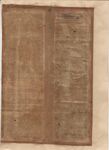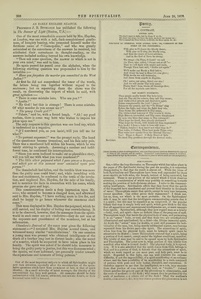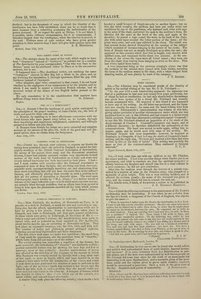Speculations
Sir,—After the long discussion on Theosophy which has taken place in the pages of The Spiritualist during the past six months, it is somewhat disappointing to find that the result is almost nil. While the ideas of both Spiritualists and Theosophists have been well expounded by those most capable on both sides, the breach, instead of being narrowed, has increased. There is one portion of the subject which I think deserves attention, a consideration of which may possibly do something towards making the position of both divisions plainer. I refer to the communicating intelligence. Spiritualists affirm that they know that the spirits of the departed have manifested and proved their identity in thousands of cases; Theosophists assert that spirits, except in very rare instances, cannot manifest. Can either prove their statements? I think not. Let us, then, see which is the most probable. On the Spiritualists’ side it may be said that the intelligence communicating asserts that it is a spirit; but this may be regarded as an outgrowth of the popular fallacy that man is simply body and spirit, which gave birth to the idea that all apparitions and supernatural intelligencies are, or must emanate from spirits. Spiritualists, although they now regard man as a trinity—body, soul, and spirit—have no definite ideas of the purposes of each. Theosophists teach that inside the physical body of man, and permeating it is an “astral” body, or soul, and that these two are overshadowed (illuminated and spiritualised) by a third—the Divine immortal spirit. At death the “astral” man (or double, or soul) still possesses the individuality of the man, but, being merely sublimated matter, may become separated from his divine part—the spirit. The attractions of spirit, when free from the physical body, must be towards spirit (must be attracted to its Maker); hence Theosophists contend that a spirit, being a portion of God, cannot, except under the highest conditions, manifest. The trinity of man may be said to be agreed upon by both Spiritualist and Theosophist. The point now is, what portion of this trinity does manifest after what is termed death? The physical body, it is agreed, rots. If it is also admitted that the spirit comes from God, belongs to God, and is a portion of God, it follows that the attractions of spirit, which we must regard as our most pure and holy part, must be to spirit. Regarded in this light, one can well conceive the extreme difficulty, if not the impossibility, of a spirit manifesting at an ordinary seance, and the bare possibility of its manifesting to a circle composed of persons with pure and holy bodies, thoughts, and aspirations. It therefore appears to me that the intelligence, as a rule, may emanate from that portion of man termed the soul, or “double.” Colonel Olcott ascribes the greater part of the phenomena to elementaries, and the souls of mediums in the flesh; why cannot they be produced by the souls of mediums at d others out of the flesh? That the medium’s double, elementaries, &c., may sometimes produce the phenomena is not doubted; but in the thousands of cases in which the identity of the intelligence has been fully established, there can be no doubt that it must emanate from a something possessing the individuality of the person deceased. If we regard the spirit as Divine, I do not think it is possible, under ordinary circumstances, for it to communicate. I therefore suggest that the intelligence, when the identity is proved, is the soul. Perhaps some of your readers who have given greater attention to these matters than I have will give their opinion upon this point.
Retford, June 17th, 1878.
Nana Sahib's Spirit at Naples
Sir,—The mistake about the name of the well, which ought to have been “Cawnpore” instead of “Lucknow,” as pointed out in a number of The Spiritualist by your correspondent, “One who was Sent to the Rescue,” must not be attributed either to Nana or to the unconscious medium, but to me.
It happened thus:—The shorthand writer, not catching the name “Cawnpore” uttered by Mrs. Bej, left a blank in its place, and, on my dictating the translation, I, through ignorance, filled the gap with Lucknow instead of Cawnpore.
Other blunders, alas! were committed in that report, I do not know whether by the negligence of my amanuensis or by the printer, and bywhich I am made to appear a ridiculous French scholar, and an incorrect writer of the names of two English ladies present at the seance.
My only consolation is in the consideration that martyrs have nsuffered things worse than these.
Naplos.
Scientific Work in Spiritualism
Sir,—Permit me, through your columns, to express my thanks for having been permitted, since my arrival in England, to attend the fortnightly meetings of the British National Association of Spiritualists, By means of the papers there read, and the discussions attendant thereon, I have had entirely uprooted certain very imperfectly formed notions of the Work done by Spiritualists as a body, and some very clearly defined knowledge has been implanted in their place. I find— and I must confess with surprise—that the National Association is composed of men of deep thought, who are doing real hard, thorough, scientific work, uncompromisingly searching out and eliminating from their creed everything that will not bear the fierce fires of the refiner’s furnace, and effectually placing their records in such a position as to defy all the powers of opposition to discredit them. The work upon Psychography, lately written by “M.A. (Oxon.),” is a further record of labours of the same inflexible type—a book which must convince anyone, not actually blind through prejudice, that no efforts have been spared to bring to bear upon the phenomena recorded all the tests which science can devise.
London, June 22nd, 1878.
Parting Words from Madame Blavatsky
...
<... continues on page 7-170 >
Editor's notes
- ↑ Speculations by Middleton, A.E., London Spiritualist, No. 305, June 28, 1878, pp. 308-9
- ↑ Nana Sahib's Spirit at Naples by Damiani, G., London Spiritualist, No. 305, June 28, 1878, p. 309
- ↑ Scientific Work in Spiritualism by Cobb, J. S., London Spiritualist, No. 305, June 28, 1878, p. 309
- ↑ Parting Words from Madame Blavatsky by Blavatsky H. P., Religio-Theosophical Journal, Chicago, July 6, 1878
Sources
-
London Spiritualist, No. 305, June 28, 1878, pp. 308-9
-
London Spiritualist, No. 305, June 28, 1878, p. 309



